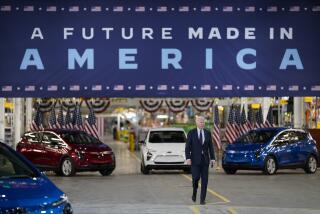Why Not Go the Extra Mile? : Will car mileage be axed from energy report?
- Share via
Is it possible that the White House policy staff favors free markets for everything but ideas? How else can one interpret its apparent reaction to an Energy Department draft for cutting American dependence on oil?
Americans use at least 2 million fewer barrels of oil a day than they would had Congress not forced Detroit to start building more fuel-efficient cars in 1975. It did so by requiring car builders to meet standards that gradually increased the average number of miles a car got per gallon from 14 to the present 27.5.
THE MILEAGE OPTION: But even with U.S. troops perhaps facing a shooting war in the Middle East--in part because Iraq’s Saddam Hussein threatens oil the United States needs--the White House doesn’t want more laws like that. It doesn’t even want to talk about them, if a flare-up last week over a list of ideas for energy policy is any clue.
The Energy Department was reportedly told that the White House doesn’t even want standards as an option that President Bush would consider when he puts together a new energy policy next year. Why? Because standards depend on regulation rather than the market.
Americans desperately need a free-wheeling debate on energy policy and on the consequences of guzzling oil without getting anything ready to replace it. But debate on energy policy is both flimsy and infrequent because few, if any, politicians dare talk candidly with Americans about energy.
The White House staff reaction to the Energy Department draft is another example of that failing. The debate will be worthless if economic dogma is allowed to dictate what ideas can even be discussed in deciding energy policy.
NOT THE ONLY OPTION: Because transportation burns up nearly 65% of the nation’s oil supply, automobile mileage is central to energy policy. It’s also true that standards are just one way to save oil. A very good bill by Sen. Richard H. Bryan (D-Nev.) to raise average mileage to 40 m.p.g. over the next 10 years narrowly failed to clear the Senate this year and will be reintroduced next year. But the free marketers in the White House could get the same result with a higher gas tax, a tax--according to one rough estimate--of about 60 cents a gallon.
In most industrial nations, gasoline with a 60-cent tax would be a real bargain. The tax in France, for example, pushes gasoline up to about $4 a gallon. But what are the odds on either the White House or Congress raising the tax by that much? Nil. It took a budget crisis of historic dimensions to get Washington to add so much as a nickel to the gasoline tax this year.
Another possibility is a California plan--vetoed by Gov. George Deukmejian--to impose a heavy sales tax on cars that don’t meet a standard such as 40 m.p.g. and use the revenue to give a rebate for cars that meet the standard or beat it. That sounds like a market incentive at work.
But the worst outcome would be to choke off debate on how to get better auto mileage. That’s the way it seems to be going; the White House must change course.
More to Read
Inside the business of entertainment
The Wide Shot brings you news, analysis and insights on everything from streaming wars to production — and what it all means for the future.
You may occasionally receive promotional content from the Los Angeles Times.










